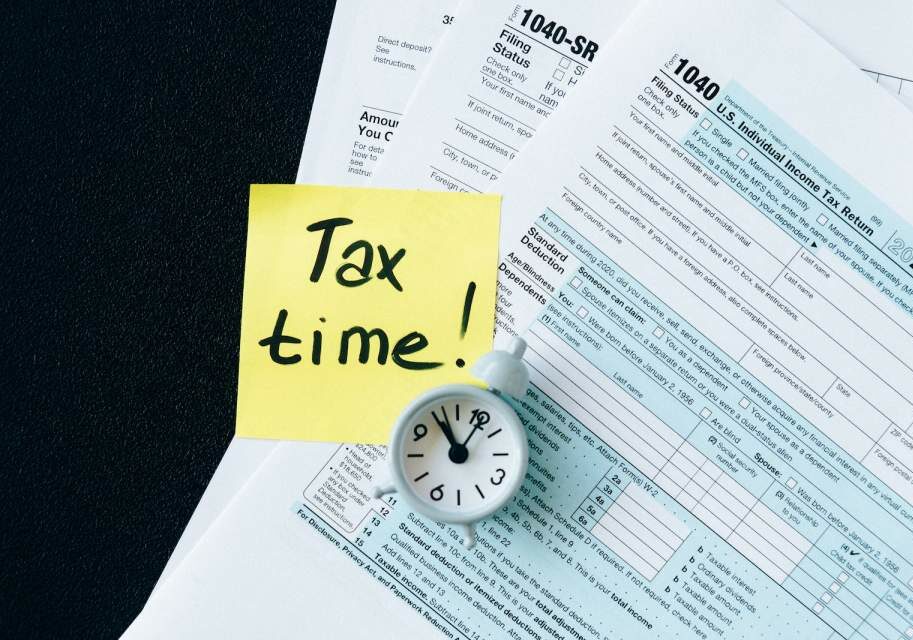Taxes play a crucial role in funding public services and infrastructure, contributing to the overall functioning of Spain’s economy. Whether you are a resident or a non-resident, it is crucial to understand the tax system in Spain to fulfill your obligations and take advantage of available deductions.
This blog will navigate the tax legislation in Spain and explore the various aspects of taxes paid in the country, including income tax, property tax, corporate tax, VAT, inheritance and gift tax, and wealth tax.
Taxes for Residents in Spain

If you live in Spain, you must file a Spanish tax return. You may also be required to pay Spanish income tax on your overseas earnings if:
- Your annual salary at work exceeds €22,000
- You are self-employed in Spain or run your own business, you earn more than €1,000 per year in rental income, and you have more than €1,600 in capital gains and savings each year
- It is your first year in Spain claiming tax residence
In Spain, taxable income is the amount left over after deductions for social security, pension, personal allowance, and professional expenses. It is important to note that deductions, allowances, and exemptions are available to reduce the taxable base.
Tax residents in Spain must disclose certain assets and rights outside the country by submitting a Form 720 to the tax authorities. This form, also known as Modello 720, must be filed to report the following:
Accounts: Individuals must declare accounts in which they are the account holder or have authority as a representative, authorized person, or beneficiary. This includes accounts in which they have disposal powers.
Securities and insurance: Rights related to securities, such as stocks and bonds, as well as insurance policies and life or temporary annuities, must be reported.
Real estate: Ownership or rights over real estate outside of Spain should be disclosed in Form 720.
It is important to note that assets or rights valued at less than €50,000 are exempt from reporting. However, individuals under the Special Tax Regime are not required to submit Form 720 for tax purposes. Remember, compliance with Form 720 is mandatory for regular tax residents in Spain to ensure transparency and accurate reporting of overseas assets.
Taxes for Non-residents in Spain
You are a non-resident if you have lived in Spain for less than 183 days. Non-residents in Spain are generally taxed only on their Spanish-sourced income. Here are some pointers about non-resident taxation in Spain:
- The tax rate for non-residents varies depending on the income earned, such as rental income, capital gains, or dividends.
- Non-resident individuals are subject to Non-Resident Income Tax (Impuesto sobre la Renta de No Residentes – IRNR).
- The tax rate for rental income earned by non-resident individuals is generally 24 percent.
- Non-residents may also be subject to a withholding tax on certain types of income, such as dividends or interest.
- Non-residents who are tax residents in a country with a Double Taxation Agreement (DTA) with Spain may benefit from reduced tax rates or exemptions.
- Foreign non-residents must obtain a Non-Resident Identification Number (Número de Identificación de Extranjeros – NIE) to fulfill their tax obligations.
- Non-resident property owners are subject to a flat rate of 19 percent on rental income derived from Spanish properties.
What is DTA?
A Double Taxation Agreement (DTA) is a bilateral agreement between two countries to eliminate or reduce the double taxation of income for individuals and companies.
These tax treaty agreements clarify which country has the right to tax specific types of income, preventing taxpayers from paying taxes on the same income in both countries.
If your country has a DTA with Spain, it is essential to understand its provisions and how they affect your tax obligations.
How to register to pay taxes in Spain?
You must register with the Spanish tax authorities to fulfill your tax obligations in Spain. As a resident, you will obtain a Tax Identification Number (Número de Identificación Fiscal – NIF) by registering at the nearest Tax Agency office. Foreign non-residents can obtain a Non-Resident Identification Number (Número de Identificación de Extranjeros – NIE) by applying at the local Foreigners’ Office (Oficina de Extranjería).
To register your duty to pay Spanish tax for the first time, you must fill out Form 30 (“Modelo 30“). You will also need this form to update your information. English-language directions are also available on Form 30 to assist you in filling out the form.
Special Taxes for Foreigners Working on an Assignment
A special tax regime is available in Spain for foreign individuals who come to work in the country under an employment agreement with a Spanish company. Commonly referred to as the Beckham Law, named after the renowned footballer, this pay income tax regime offers specific tax benefits. Here are the key points:
- The applicable tax rate is 24 percent for income up to €600,000, and a higher rate of 45 percent is applied to amounts exceeding €600,000.
- Capital gains tax on interest earned outside of Spain is not payable under this regime.
- To qualify for this regime, certain conditions must be met, including being a Spanish tax resident (spending more than 183 days a year in Spain) and not having been a resident in Spain within the last ten years.
- At least 85 percent of your work duties must be carried out within Spain.
- The maximum annual income eligible for this regime is €600,000.
Filing Tax Returns in Spain

- If your income from all sources is below €8,000 and your bank interest or investment income is less than €1,600, you are not required to file a tax return.
- Similarly, if your rental income is below €1,000 or your employment income is below €22,000, you are exempt from filing a tax return. This is because your employer would have already deducted your Spanish income tax in such cases.
If you need to file a tax return, use “Modelo 100,” the specific form for income tax declaration in Spain.
Tax Deductions and Allowances
In Spain, the tax system for individuals includes various personal allowances and deductions, which can reduce the taxable income and thus the tax liability. The treatment of savings income and foreign pensions, such as those from the UK, is particularly relevant for expatriates living in Spain or those with financial interests across both countries. It’s important to understand these aspects to optimize tax planning and compliance.
Personal Allowances
Spain offers personal allowances that reduce the amount of income subject to tax. These can include:
- General Personal Allowance: For the tax year 2021, this was set at €5,550 for taxpayers under 65 years of age.
- Additional Allowances: Additional allowances are available for taxpayers aged 65 and over (€6,700) and those aged 75 and over (€8,100).
- Allowance for Descendants: Taxpayers can claim allowances for children, which vary depending on the number of children and their age.
- Allowance for Ascendants: Similar allowances are available for supporting elderly relatives, under certain conditions.
Deductions for Savings Income
Savings income in Spain includes interest, dividends, and capital gains from the sale of assets. Spain applies a separate tax rate to savings income, distinct from the general income tax rates:
- Tax rates for savings income are applied at progressive rates, starting from 19% for income up to €6,000, 21% for income between €6,000 and €50,000, and 23% for income above €50,000 (rates as of the 2021 tax year).
Taxation of UK Pensions in Spain
The taxation of UK pensions in Spain depends on the type of pension and the residency status of the recipient:
- State Pensions: UK state pensions are taxable only in Spain for residents of Spain, according to the Spain-UK Double Taxation Agreement. They must be declared as income and are subject to Spanish income tax rates.
- Private Pensions: Private pensions are also taxable in Spain for Spanish residents. This includes workplace pensions and personal pension schemes.
- Government Service Pensions: These remain taxable only in the UK, even if the recipient is a resident in Spain. This includes pensions for government employees, such as teachers, police officers, and military personnel.
- Lump Sum Pension Withdrawals: The taxation of lump-sum withdrawals from pension schemes can be complex and depends on various factors, including the timing of the withdrawal and the amount.
Special Considerations
- Beckham Law: Some individuals moving to Spain for work may qualify for the Beckham Law, allowing them to pay tax at a flat rate on their income for a fixed period, excluding foreign income from taxation.
- Modelo 720: Residents in Spain must declare their overseas assets, including pensions, if the total value exceeds €50,000.
Tax planning and compliance for expatriates are complex areas that require careful consideration of various factors, including residency status, the source of income, and applicable tax treaties.
Digital Nomads and Remote Workers Taxation
Spain is currently updating its tax laws and regulations to accommodate the growing trend of remote work and the unique circumstances faced by digital nomads and remote workers. This evolution reflects the increasing number of remote workers globally. The changes are particularly beneficial for those who come from other countries to live and work in Spain temporarily.
Tax Residency: Understanding tax residency is crucial for digital nomads and remote workers. In Spain, you are considered a tax resident if you spend more than 183 days in the country within a calendar year or if your main professional activities or economic interests are based in Spain. Tax residents are taxed on their worldwide income.
Social Security Contributions: Apart from income tax, it’s important to consider social security obligations. If you’re working for a non-Spanish company but living in Spain, the situation can be complex, and you might need to make contributions in Spain, depending on bilateral agreements and your specific circumstances.
Double Taxation Treaties: Spain has double taxation agreements with many countries, which can affect how digital nomads and remote workers are taxed on their income. These treaties aim to prevent double taxation on the same income in two countries.
Currently, digital nomads and remote workers are subject to a 24 percent tax rate, limited to €600,000 per year, for the first four years. If you earn more than that, you will be taxed at 48 percent.
Property Taxes in Spain

- The tax rate for the IBI can vary across municipalities and is typically a percentage of the cadastral value, typically ranging from 0.4 percent to 1.1 percent.
- Property owners are responsible for paying the IBI, regardless of whether the property is occupied or vacant.
- The tax revenue generated from the IBI is primarily used to fund local public services and infrastructure in the municipality where the property is located.
- The payment of the IBI is typically made annually, and property owners receive a notification or bill from the local tax authorities indicating the amount due and the payment deadline.
- In addition to the IBI, there may be other local or regional taxes related to property ownership, such as the municipal capital gains tax (Impuesto sobre el Incremento del Valor de los Terrenos de Naturaleza Urbana – IIVTNU) or the garbage collection tax (Tasa de Recogida de Basuras). These taxes can vary depending on the specific municipality or region.
Capital Gains Tax in Spain
- Capital gains tax may be applicable when selling assets such as property, stocks, or businesses. In Spain, the tax rate on capital gains can vary depending on the type of asset and the length of time it was held. Deductions and exemptions may apply, particularly the property transfer tax for individuals selling their primary residence.
Corporate Taxes in Spain
The corporate tax, or Impuesto sobre Sociedades, is imposed on companies operating in Spain:
- The corporate tax in Spain is known as the Impuesto sobre Sociedades. It applies to companies and legal entities operating in Spain, including resident and non-resident entities.
- The standard corporate tax rate in Spain is currently set at 25 percent. However, reduced rates may be available for small and medium-sized enterprises (SMEs) or companies engaged in certain activities or industries.
- Companies are required to file an annual corporate tax return, reporting their income, expenses, and other relevant financial information. Deductions, allowances, and exemptions specific to business activities and investments may be available to reduce the taxable base.
VAT (IVA) in Spain
Value Added Tax (Impuesto sobre el Valor Añadido – IVA) is a consumption tax applicable to the sale of goods and services in Spain. It is similar to the sales tax in other countries. The standard VAT rate is 21 percent, but ten percent and four percent reduced rates apply to specific goods and services. Businesses are responsible for collecting and remitting VAT to the tax authorities.
Inheritance and Gift Tax in Spain
In Spain, when receiving an inheritance or gift, individuals may be subject to an inheritance tax and gift tax (Impuesto sobre Sucesiones y Donaciones). The tax rate and exemptions vary depending on the relationship between the donor and the recipient and the value of the assets transferred. Considering these taxes when planning and managing inheritances or gifts is important.
Wealth Tax in Spain
Wealth tax (Impuesto sobre el Patrimonio) is levied on individuals’ net worth. The tax applies to residents and non-residents who own significant assets in Spain. The tax rate is progressive, with higher rates applied to higher levels of net worth. Certain deductions and exemptions may apply, and it is essential to evaluate your assets and liabilities to determine your wealth tax obligations.
Tax in Spain for Married Couples
In Spain, married couples can file their income tax returns jointly or individually. Opting for joint filing can have certain tax advantages, as the tax brackets and deductions may be more favorable for couples. It is recommended to assess both options and determine the most advantageous approach based on your circumstances.
Tax Treaties and Foreign Asset Reporting Laws
Spain has an extensive network of tax treaties with various countries, including the United Kingdom, aimed at avoiding double taxation and preventing tax evasion. These treaties typically cover income tax, corporate tax, and capital gains tax, ensuring that individuals and entities are not taxed twice on the same income.
The specific agreements define residency for tax purposes, taxable income, and the method of eliminating double taxation.
Spain-UK Tax Treaty
The tax treaty between Spain and the UK is designed to clarify which country has the right to tax various forms of income. This includes employment income, pensions, business profits, and capital gains. The treaty helps determine how and where individuals and corporations should pay their taxes, depending on their country of residence and where their income originates.
Key points covered in such treaties include:
- Residency: Criteria for determining tax residency to establish which country has taxing rights.
- Permanent Establishment: Definitions that determine where a business has sufficient presence to be taxed.
- Withholding Taxes: Reduced rates or exemptions on dividends, interest, and royalties paid across borders.
- Pensions: Taxation rights on pensions, including government service pensions and private pensions.
- Elimination of Double Taxation and Tax Burden: Methods to avoid double taxation, usually through tax credits or exemptions.
Foreign Asset Reporting Laws in Spain
Spain has strict foreign asset reporting requirements. Residents in Spain are required to report their assets held outside Spain if the total value exceeds €50,000 in any of the following categories:
- Overseas bank accounts
- Overseas investments
- Real estate and rights over real estate located abroad
The Modelo 720 declaration must be filed by the end of March each year for the assets held in the previous year. It is only necessary to re-report when the value of an already reported asset increases by more than €20,000, or if the taxpayer disposes of an asset or acquires a new one.
Compliance and Penalties for Non-Compliance
Compliance with both the tax treaties and foreign asset reporting laws is crucial. Non-compliance can result in severe penalties. For Modelo 720, the penalties for non-disclosure, incomplete disclosure, or incorrect disclosure can be particularly harsh. They may include:
- Fines starting from €5,000 per detail or set of data related to the same asset, with a minimum fine of €10,000.
- A minimum fine of €100 for each data or set of data if the declaration is filed late without prior notification from the tax authorities, with a minimum of €1,500.
- Fines equivalent to 150% of the tax charge resulting from undeclared or inaccurately declared assets.
The Spanish tax authorities (Agencia Tributaria) are vigilant in enforcing compliance with these reporting requirements. It’s essential for individuals and entities affected by these laws to ensure accurate and timely reporting to avoid penalties.
Key Takeaways
Understanding the tax system in Spain is essential to ensure compliance with tax obligations and take advantage of available deductions. While this blog provides a comprehensive overview, it is always advisable to consult with a tax professional or refer to official sources for the most up-to-date and accurate information regarding your specific tax situation.
You can confidently navigate the Spanish tax system by staying informed and fulfilling your tax responsibilities.
How Can Global Citizen Solutions Help You?
Global Citizen Solutions is a boutique migration consultancy firm with years of experience delivering bespoke residence and citizenship by investment solutions for international families. With offices worldwide and an experienced, hands-on team, we have helped hundreds of clients worldwide acquire citizenship, residence visas, or homes while diversifying their portfolios with robust investments.
We guide you from start to finish, taking you beyond your citizenship or residency by investment application.

Frequently Asked Questions about Taxes in Spain
Are taxes high in Spain?
Taxes in Spain can vary depending on the type of tax and individual circumstances, but overall, Spain’s tax rates are generally in line with other European countries.
Do you pay house tax in Spain?
Yes, property owners in Spain are required to pay the annual property tax known as Impuesto sobre Bienes Inmuebles (IBI).
What is the tax rate for non-residents in Spain?
The tax rate for non-residents in Spain varies depending on the type of income earned but generally ranges from 19 percent to 24 percent.
Do foreigners pay taxes in Spain?
Yes, foreigners living and working in Spain are subject to Spanish tax laws and are required to pay taxes on their Spanish-sourced income.
Can I live in Spain without paying taxes?
If you are a tax resident in Spain, you are generally obligated to pay taxes on your worldwide income. However, tax treaties and exemptions may apply depending on your specific circumstances.
Do US retirees pay taxes in Spain?
US retirees living in Spain may be taxed on their worldwide income. It is recommended to consult with a tax professional to understand the specific tax obligations and potential tax agreements between the US and Spain.
How much is sales tax in Spain?
The standard Value Added Tax (VAT) rate in Spain is 21 percent. However, ten percent and four reduced rates apply to certain goods and services.
What is the personal tax allowance in Spain?
As of the latest information available, the personal tax allowance in Spain is €5,550 for individuals under 65. Higher allowances apply to individuals over 65 or with disabilities.
How much is the tourist tax in Spain?
Spain does not currently impose a nationwide tourist tax. However, some regions or municipalities may have local taxes or fees that apply to tourists, such as the “tourist tax” in the Balearic Islands or Catalonia’s tourist tax on overnight stays.
What encompasses 'income tax' in Spain?
In Spain, income tax includes various forms of income like employment income, savings income, and other income.
It’s calculated based on an individual’s taxable income for tax purposes, applying specific tax rates.
For Spanish tax residents, it covers worldwide income, while non-resident income tax pertains to income earned within Spain by non-residents.
How is 'personal income tax' calculated for Spanish residents?
Personal income tax in Spain involves a comprehensive calculation including savings taxable income and specified foreign financial assets.
Important for both Spanish tax residents and those tax resident in Spain, it encompasses global income and various deductions, with special rules for income derived from abroad.
How does Spain handle 'double taxation' for its residents?
Double taxation in Spain affects those with income taxed in both Spain and another country.
To mitigate this, Spanish tax residents can use foreign tax credit and avoid double taxation agreements, relevant for individuals with foreign financial assets.
What factors into determining 'taxable income' in Spain?
Determining taxable income for tax purposes in Spain involves considering different income types and deductions.
The tax rates depend on income level, and tax credits are available for specific situations, including Spanish property tax.
What are the tax obligations of a 'tax resident in Spain'?
Being a tax resident in Spain entails the responsibility to pay tax on worldwide income. This includes adherence to the tax year in Spain, which runs from January 1st to December 31st, covering all income sources.
How does Spain approach 'tax avoidance'?
To combat tax avoidance, Spain enforces strict regulations for tax purposes, including mandatory reporting of income derived from various sources and penalties for non-compliance.
How much are taxes in Spain?
In Spain, the taxation system can vary based on various factors such as gross income, business income, and interest income.
Expats in Spain, including American retirees, are subject to taxes in Spain for expats and expat taxes in Spain.
This includes property taxes in Spain for both residents and property taxes in Spain for non-residents. Payroll taxes in Spain and social security contributions are also a part of the tax structure.
Here’s a general overview:
Income tax: For residents, income tax rates are progressive, ranging from about 19% to 47%. Non-residents are usually taxed at a flat rate of 24% on income earned in Spain.
Corporate tax: The standard corporate tax rate is 25%.
Value-Added Tax (VAT): The standard VAT rate is 21%, with reduced rates of 10% and 4% for certain goods and services.
Property tax: This varies by location and property value but generally ranges from 0.4% to 1.1% of the property’s cadastral value annually.
Wealth tax: Applicable in some regions, it typically ranges from 0.2% to 2.5% of the value of certain assets.
Capital gains tax: Ranges from 19% to 26% depending on the gain amount.
Inheritance tax: Varies greatly depending on the relationship to the deceased and the amount inherited, and can be very high in some regions.
You should bear in mind that Spain has different tax regions, and some, like the Basque Country and Navarre, have their own tax regimes.
Additionally, tax treaties and specific personal circumstances can affect tax rates and liabilities.
Are taxes in Spain high?
The perception of whether taxes are high in Spain can depend on one’s home country’s tax rates.
The Spanish government oversees a comprehensive system including taxes on dividend income, crypto taxes in Spain, and tax payable on various types of income.
For foreigners, especially from the European Economic Area, tax rates might feel different. Moreover, foreign earned income exclusion rules may apply differently.
Is there tax in Spain for foreigners?
Yes, foreigners in Spain, including those from outside the European Economic Area, are subject to various taxes. This encompasses taxes for American retirees in Spain and expat taxes in Spain.
Foreigners must also consider the fair market value of their assets when dealing with tax returns and primary tax forms.
The availability of tax credits and adherence to tax rules are essential aspects of the tax system in Spain for foreigners.
Who oversees the banking system in Spain?
The banking system in Spain sees regulation by both national and European authorities. The Banco de España, the National Securities Market Commission (CNMV), and the Ministry of Economy and Business are the primary national regulators.


